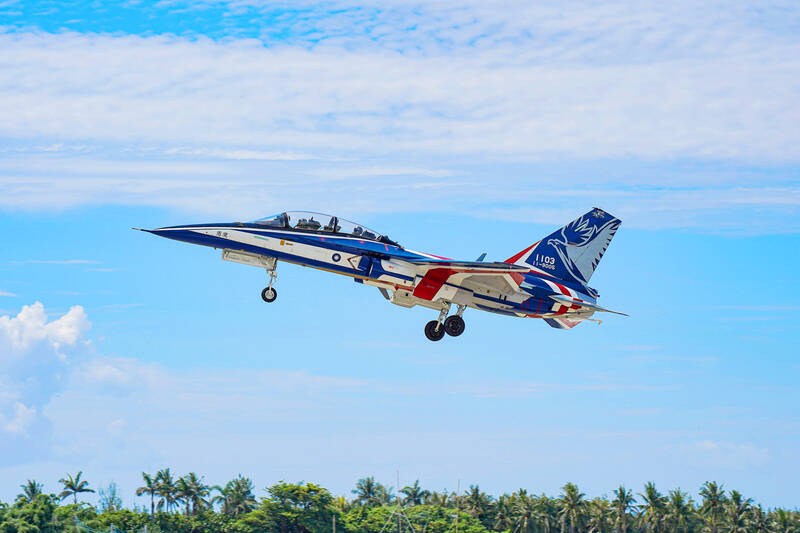The air force should look to domestic manufacturers to replace its fleet of Beechcraft T-34C trainer aircraft, Aerospace Industrial Development Corp (AIDC) general manager Ma Wan-chun (馬萬鈞) said.
The Taiwanese defense aviation sector is entirely dependent on air force contracts and therefore needs the political leadership to be clear about its vision for the naiton, Ma told the Liberty Times (the Taipei Times’ sister newspaper) in an interview published on Thursday.
The air force is interested in obtaining new propeller planes to replace its Beechcraft T-34Cs, which are nearing the end of their service life, as well as domestically made aircraft power plants and fifth-generation fighter jets, Ma said.

Photo: Aaron Tu, Taipei Times
The T-34Cs are turbo-prop aircraft used by the air force to train rookie pilots, while the AIDC T-5 Brave Eagle jets are used for advanced pilot training.
Implementation of plans to acquire those items would have a decisive impact on Taipei’s policy to transform the nation’s aerospace and defense industry into a global powerhouse, he said.
AIDC is particularly interested in the potential contract to replace the trainer aircraft, as a cost-benefit analysis suggests that a lease with a foreign airplane manufacturer would not benefit Taiwan, he said.
The party that provides the replacement aircraft would demand prices to meet its bottom line and Taiwan is not likely to get a licensed production deal that would allow aircraft to be made for export, Ma said.
Even if a lease were to include licensed production, the nation’s involvement would be limited to meeting domestic demand or doing grunt work that does not bolster Taiwan’s technological potential, he said.
Moreover, obtaining jets domestically would enable the Taiwanese aerospace sector to gain experience in designing and manufacturing advanced aircraft, he said.
AIDC learned lessons in aircraft design from developing the F-CK-1 jets for the Indigenous Defense Fighter program, he said, adding that the nation had to rely on imports for aircraft systems.
The Advanced Jet Trainer Program not only led to the creation of AIDC T-5 jets, but also the beginnings of an indigenous industrial capability to make aircraft systems, he said.
AIDC has 200 downstream partners in the production of aircraft systems, including antennas, lights and other equipment for the T-5 jets, Ma added.
While only 55 percent of the parts used in T-5s were sourced in Taiwan, AIDC believes it can source 75 percent of a turbo-prop design indigenously, he said.
Giving AIDC the contract for a turbo-prop trainer aircraft would allow Taiwan to increase its military self-sufficiency, he said.
Furthermore, the nation would need to boost its ability to produce aircraft systems if the nation is to pursue the development of an indigenous fifth-generation fighter for the Advanced Defense Fighter program, Ma said.
The most crucial part of a fifth-generation fighter is the aircraft systems and not the airframe itself, he said, adding that the nation possesses the technological potential, but not yet the experience to produce such aircraft.
Additional reporting by Liou Yu-chieh and Wu Che-hu

A relatively large earthquake may strike within the next two weeks, following a magnitude 5.2 temblor that shook Taitung County this morning, the Central Weather Administration (CWA) said. An earthquake struck at 8:18am today 10.2km west of Taitung County Hall in Taitung City at a relatively shallow depth of 6.5km, CWA data showed. The largest intensity of 4 was felt in Taitung and Pingtung counties, which received an alert notice, while areas north of Taichung did not feel any shaking, the CWA said. The earthquake was the result of the collision between the Philippine Plate and the Eurasian Plate, the agency said, adding

Snow fell in the mountainous areas of northern, central and eastern Taiwan in the early hours of yesterday, as cold air currents moved south. In the northern municipality of Taoyuan, snow started falling at about 6am in Fusing District (復興), district head Su Tso-hsi (蘇佐璽) said. By 10am, Lalashan National Forest Recreation Area, as well as Hualing (華陵), Sanguang (三光) and Gaoyi (高義) boroughs had seen snowfall, Su said. In central Taiwan, Shei-Pa National Park in Miaoli County and Hehuanshan National Forest Recreation Area in Nantou County saw snowfall of 5cm and 6cm respectively, by 10am, staff at the parks said. It began snowing

HOLIDAY EXERCISE: National forest recreation areas from north to south offer travelers a wide choice of sights to connect with nature and enjoy its benefits Hiking is a good way to improve one’s health, the Forestry and Nature Conservation Agency said, as it released a list of national forest recreation areas that travelers can visit during the Lunar New Year holiday. Taking a green shower of phytoncides in the woods could boost one’s immunity system and metabolism, agency Director-General Lin Hwa-ching (林華慶) cited a Japanese study as saying. For people visiting northern Taiwan, Lin recommended the Dongyanshan National Forest Recreation Area in Taoyuan’s Fusing District (復興). Once an important plantation in the north, Dongyanshan (東眼山) has a number of historic monuments, he said. The area is broadly covered by

Global bodies should stop excluding Taiwan for political reasons, President William Lai (賴清德) told Pope Francis in a letter, adding that he agrees war has no winners. The Vatican is one of only 12 countries to retain formal diplomatic ties with Taiwan, and Taipei has watched with concern efforts by Beijing and the Holy See to improve ties. In October, the Vatican and China extended an accord on the appointment of Catholic bishops in China for four years, pointing to a new level of trust between the two parties. Lai, writing to the pope in response to the pontiff’s message on Jan. 1’s